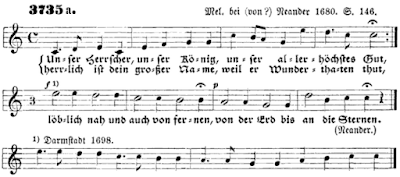Here is my translation of the seasonal praise hymn, “Lobet und preiset den Schöpfer des Himmels und Erden” (? Paul Henkel, d. 1825), in NEGB #245 with melody assignment “Lobe den Herren, den mächtigen König der Ehren” and title “On the seasons of the year.” Despite the title, only summer is expounded on, from which we may surmise that several other stanzas, omitted or unwritten, would have treated the other seasons. This is the final hymn of NEGB’s first edition. The 2nd adds in an appendix a few more common hymns, already translated. The hymn is marked with the cipher of a colon (:.) and period which may be taken as the typographer’s erstatz double-dagger and period (‡.) otherwise employed to signify the works of Paul Henkel, especially since the German text exhibits characteristics of his style (if I may say so) and appears nowhere else to my knowledge.
PRAISE and adore ye the Maker of earth and of heaven,
Who summer, winter, and all the year’s seasons hath given!
Come, glorify
Him praised by angels on high,
By love and thankfulness driven.
2 Lo, the fair summer with bounties so fruitfully raining,
By our kind heavenly Father’s most gracious ordaining!
Praise and adore
Him who doth bid you implore,
For so He gives, all sustaining.
3 Lo, the green field and the pasture and meadow-land glorious!
More glorious yet are the sights that confront the victorious:
Beauteous and fair
Shall be the holy ones’ share
When we behold Him before us.
4 God’s loving care for all creatures in summer suffices,
Since He hath fashioned all things, and His will so devises
Them to sustain,
So doth He gen’rously reign;
Therefore my praise to Him rises!
5 God, who sustainest my body, Thy bounties bestowing,
Oh, grant all that I receive may this lesson be showing:
From Thee alone
Comes every good I have known:
Praise to Thee only is owing.
Translation © 2023 Matthew Carver.
GERMAN
Lobet und preiset den Schöpfer des Himmels und Erden,
der Winter, Sommer und alle Jahrs-Zeiten läßt werden.
Bringet ihm Ehr,
lobet und preiset ihn sehr,
gleichwie die himmlischen Heerden.
2 Sehet den Sommer mit allen den Früchten und Gaben,
die euch der gnädige himmlische Vater läßt haben.
Lobet und preist
ihn, der euch dieses selbst heißt,
er gibts, daß ihr euch sollt laben.
3 Die grünende Felder, Wiesen und herrlichen Auen, [Die Wiesen, grünende Felder und…]
noch herrlicher wenn ihr sie dort im Himmel werdt schauen.
Prächtig und schön,
wo alle Heiligen stehn,
und Gott alleine vertrauen.
4 Gott gibt im Sommer, Menschen und Vieh, Früchten die Fülle,
dieweil er alles erschaffen, so war es sein Wille;
zu erhalten,
sie mit Reichthum verwalten,
drum preis ich ihn in der Stille.
5 Gott, der meinen Leib mit zeitlichen Güter ernähret,
o gib mir die Gnade, daß alles dieses mich lehret,
von dir allein
alle Gaben kommen sein,
und dir allein Preis gehöret.
.
..





















